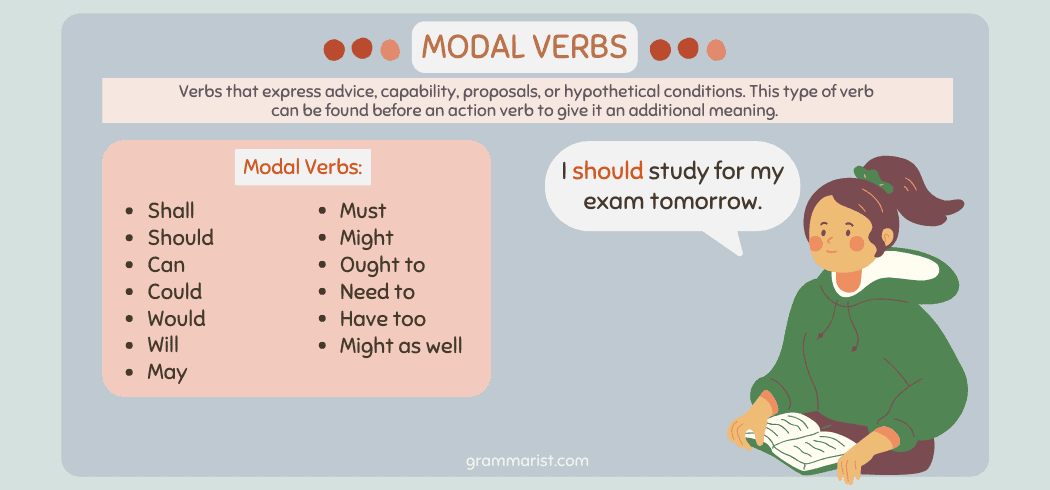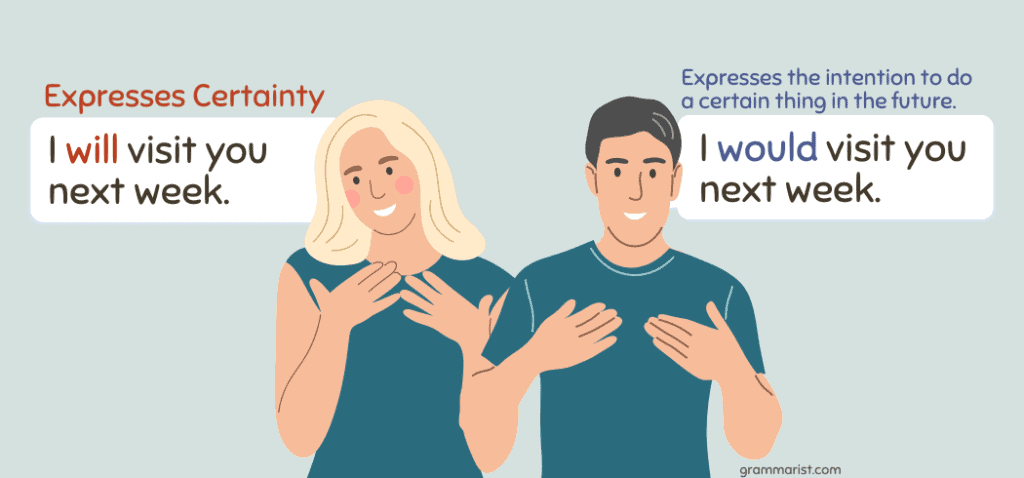Most people know that the word “would” is the past tense of “will, but there is a subtle difference between the two. In this blog post, we will see the difference between “will” and “would,” and we will provide some examples to help you understand how to use them correctly.
Will vs. Would
“Will” is a modal verb used to talk about willingness and beliefs and to make promises, requests, and offers. The modal verb “would” is the past tense form of “will.” It’s used to talk about hypotheses, uncertainties, and the past and to have polite conversations.
The Modal Verbs Must, Have to, May, Might: Rules of Use

For example, the modal verb “must” expresses a sense of necessity or obligation, whereas “may” indicates that a particular action is possible or permissible within certain constraints. Similarly, the verb “have to” conveys that something is required by law or rule. In contrast, the other modal verbs are often used when asking for permission or inquiring about possibilities.
Therefore, if you want to use these auxiliary verbs correctly in your writing, it is essential to understand their different meanings and the contexts in which they should be used. I’ll go into detail on this, so you better understand how to use them.
Will vs. Would: How They’re Different

Two verbs are commonly used when we think about a future situation and what might happen: will and would. Although they sound very similar, these two words have different meanings and functions in a sentence.
The first verb, will, is typically used to express certainty or resolve.
For example:
- If you know that something will happen in the future, you’d say, “I will visit my grandparents next weekend.”
This implies that there is no question whether or not you will do it; it’s already been decided and planned for.
On the other hand, “would” is often used to express either possibility or uncertainty about the future or to talk about the past.
In other words, like “will,” this form expresses more of a commitment to an idea than simply saying, “I want to.”
For example:
- You could say “I would visit my grandparents next weekend” if it were not definite whether or not you’d go – maybe you still need to work out the details with your family.
Or perhaps there is another event scheduled for that same weekend; in this case, saying “I would visit my grandparents next weekend” suggests that you’d really like to go, but the other plans are getting in the way.
In short, will “expresses” certainty, and “would” expresses the intention to do a certain thing in the future.
When to Use Will
In general, “will” expresses future events or actions. It can be used as a simple prediction about what will happen in the future, or it can be used to indicate determination or intention to do something.
For example, we might say, “I think it will rain tomorrow,” to make a simple prediction about the weather, or we might say, “I will never give up,” to indicate our strong desire or intention to see something through.
Additionally, “will” is often used in conditional sentences; for example, when we use the present tense after the conditional word “if,” such as: “If she wins, I will be so happy.”
When to Use Would
When “would” is used in a sentence, it typically indicates that an action in the past or future was (or will be) conditional on some event or circumstance. In other words, the action would have (or will have) taken place under different conditions.
For example, we might say, “She would hold my hand whenever we crossed the street.” In this case, the act of holding hands would not necessarily have occurred if they had not taken a particular route to get across the street.
Alternatively, we could use “would” to talk about something unlikely to happen in the present or future. For instance, we might say, “The evil overlord would never fall for such an obvious trap,” implying that it is not at all likely that such an event will take place in the story.
Using “Will” to Give Info About the Future
A common form of the verb “will” is used to discuss a future event. When you use this particular “will,” you indicate that something specific will happen at a point in the future.
For example, if you say, “I will be attending college next year,” you are indicating that you plan to attend college at some time after the present moment.
In addition, using “will” for future events can also indicate that something is highly likely or expected. For instance, if we say, “It will be sunny tomorrow,” we predict a high likelihood of sunshine based on current conditions.
Using “Will” When Willing to Doing Something
When we’re able and willing to do something, it can be useful to use the word “will” in our sentences. For example, if someone asks you if you’ll be joining them at a party later that night, you might say, “Yes, I will,” to affirm your willingness to attend.
In general, the word “will” can indicate that we are prepared to take action or perform a certain task. When we feel certain about our ability to do something, using “will” can help communicate this sense of confidence to others.
Using “Will” for Rules or Orders
When giving orders or rules, it is often best to use the word “will.” This helps to convey a sense of command and emphasizes the importance of urgency.
For example, imagine that you are in an office setting, and someone asks you to come into the manager’s office. If they simply say, “Please come into my office,” then you may assume that it is only a polite request and delay coming over.
However, if they say, “Will you please come into my office,” then it becomes clear that this is not just a preference or suggestion but an imperative command.
Additionally, using “will” helps create a sense of authority and instills respect in others by emphasizing your position as a leader or supervisor.
When giving orders or rules, it is often best to use the word “will” as opposed to alternatives such as “could” or “might.” Doing so will help ensure that your message gets across clearly and effectively.
Using “Would” for Expectations in the Past
When discussing past expectations and assumptions, it is common to use the word “would.” For example, we might say something like, “We would have never believed that this would happen.”
This usage is a way to acknowledge that things turned out differently than we had initially expected.
Not only does “would” help to convey that the speaker’s expectation was different than what actually happened, but it also communicates a sense of regret or hindsight.
Because of its ability to evoke these emotions, the use of “would” when discussing past expectations is quite common and widely accepted.
Using “Would” to Talk About Past Habits
When talking about past habits or routines, many people use the word “would” to describe their previous behaviors. For example, you might say, “I would wake up early every morning to work out,” or “I would always stop for coffee on my way to work.”
This effectively communicates your past actions, as it gives a sense of familiarity and consistency. Using “would” can help to express how a habit felt in the moment — for example, describing the ease with which you might do something rather than saying that you did it all the time.
Using “Would” When Talking About the Future in the Past
When we talk about future events that have already happened, we often use the conditional “would.” For example, if we say that someone would arrive at a certain time or take a certain action in the past, it means they arrived or did that action after we said they would.
Also, when we discuss what could have happened in the past, such as “if I had checked,” “I would have known,” or “he would have found out,” it means what didn’t happen. Using “would” is most common when discussing future circumstances and dates using a time frame like “next Tuesday.”
Not only is this construction ubiquitous in everyday speech and writing, but its usage is also backed up by decades of researchers and linguists.
Using this marker to talk about the past directly affects how people understand our spoken or written words, including understanding duration. You can change how long an event seems based on something you said before it occurred.
The Bottom Line
In the end, the key thing to remember is that “would” is the past tense of the modal verb “will,” and each is used in different circumstances. While “will” is commonly used to talk about the future, “would” is frequently used to discuss the past or different possibilities and hypothetical situations.
